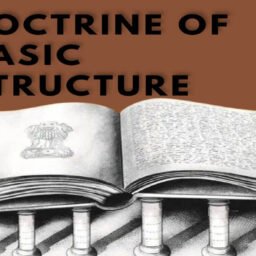INTRODUCTION
The police are one of the most integral parts of any country’s workforce. Whenever someone’s safety is put at risk, troubled, or outrightly violated or challenged, or when someone is a victim of a crime, the department that the person contacts or approaches are the police department. The police are the upholder of the law and order, which is possibly one of, if not ‘the most’ important tasks that need to be carried out by any service of the country, and is responsible to keep the citizens safe and minimizing the crime inside the nation. Due to the police department playing such an important role, the whole department is expected to be available and accessible at service to any and every citizen of the country at any given point in time. To properly handle such a responsibility, police is divided into numerous sub-departments or organisations, with various heads, (most of the time IPS) heading them. These heads and their subordinates enjoy various powers granted to them by the constitution. With these powers, there also comes the risk of these powers getting misused and often leading to grave violations of the human rights of citizens.
To counter such violations, the Constitution of India provides its citizens with various rights, such as Article 21, which talks about the protection of the life and liberty of a citizen. This right ensures that convicts or people going under trial, are not deprived of their basic human rights at any given point in time. This mandates the police to ensure that any steps taken by them, must always be lawfully justified.
RIGHTS ENJOYED BY THE CITIZENS BEFORE/WHILE INTERACTING WITH THE POLICE
The ‘Section 29’ of the Indian Police Act, 1861 entails that if any person suffers any sort of harm due to any kind of misconduct on the part of a police officer, that officer is liable to up to 3 months of imprisonment and a fine equivalent to the 3-month salary of the official.
To address any complaints regarding the police department, ‘Police Complaint Authority (PCA)’ was set up in 2006. Any victim of any sort of police brutality or misconduct files its complaint in the PCA, which also helps to bring in any kind of reforms or changes needed in the department, subsequently improving the whole service.
It has also been directed by various courts at multiple events, that the police shall not intimidate or frighten any person throughout any kind of process which is being conducted at the time. It is also essential for the police to maintain records of the inquiry by writing down or recording the details regarding it in a journal or log.
A person can also move to the Superintendent of Police (SP), an officer of the Indian Police Service (IPS), in case a police officer refuses or is unsuccessful in filing the FIR of that person. That person can even move to the DM (District Magistrate), an officer of the Indian Administrative Service (IAS), of the district.
When a person is called upon or summoned by the court acting as a witness, a police officer shall issue a writ ordering the person to attend the court at the given time and date, under ‘Section 160’ of the CRPC.
When a person is detained by the police, the citizen should ensure the proper recording and filing of the ‘inspection memo’ and the ‘detention memo’. Both are essential, as they contain information regarding any previous health conditions prior to the detention and the information regarding the basic details of a person such as the name of the people involved, and the details regarding the case, respectively.
RIGHTS ENJOYED BY AN ARRESTED CITIZEN WHILE DEALING WITH THE POLICE
‘Section 46’ of the CRPC essentially talks about how the police shall not use lethal force or impose death on any person if they are not charged with a crime that does not impose a death penalty or any sort of life imprisonment which can be deemed to be equal to a death penalty. The section also directs that a female shall only be arrested and taken into custody by a female police officer.
‘Section 50(1)’ of the CRPC entails that “any police officer or other person arresting any person without a warrant shall forthwith communicate to him full details of the offence for which he is being arrested or other reasons for such arrest.” Also, ‘Article 22(1)’ of our constitution states that “No person arrested shall be held in custody without, as soon as possible, being told of the reasons for such detention, nor shall he be refused the right to consult and defend a legal practitioner of his choosing.” It is also mandatory for the police officer to inform any acquaintance, friend or family relative of the arrested person about the details of the arrest.
‘Section 45’ of the CRPC states that ‘members of the armed forces shall not be arrested due to an act committed in the performance of their duties, except with the central government’s consent.
‘Section 50(2)’ of the CRPC states that if the police arrest a person in the absence of a warrant, shall duly be informed instantly with respect to the details regarding the arrest. If the arrest is bailable, then the arrested individual shall also be duly informed regarding the person’s right with respect to the bail. This section highlights Article 21 of the Constitution of India. The constitution also makes it mandatory for the accused person to be presented in front of a Judicial Magistrate within 24 hours of the arrest of the individual. The main motive of this rule is to bring the accused as quickly as possible so that no delay takes place.
ACCOUNTABILITY OF THE POLICE
The Supreme Court has issued various directions regarding the police department with respect to ensuring that the whole police department is free and away from ‘unconstitutional political influence’, the apex court also directed to fix a definite term for various heads in the police department such as the DGP, ADG, IG, DIG etc. Police Establishment Board was also established to handle the matters related to the transfers and promotions of the police personnel below the post of the Superintendent of the Police.
CONCLUSION
It is evident that the police force of the country is essential for smooth functioning and administration of the nation, but due to the wide ambit of powers handed over to the police officials, there is always room for its misuse which eventually lead to the violation of the rights of the people. To counter this, new laws and policies must be introduced to better monitor the activities of the police officials and enhance the transparency inside the police department. There is also a grave need for better redressal mechanisms so that the complaint filing process is made more transparent and streamlined. Not only these mechanisms would result in better administration but would increase the public’s trust in the police resulting in a greater interaction, which would ultimately help in better upliftment of the law and order.
Author(s) Name: Suryansh Beohar (Chanakya National Law University, Patna)
















